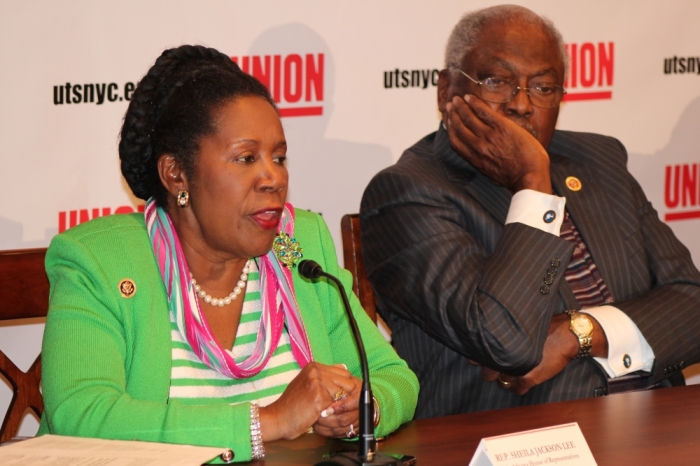Democrats in Congress Urged to Be 'Bold' Like Republicans With God Talk; Assert Christian Faith Supports Gov't Funding for Planned Parenthood, Welfare

WASHINGTON — The progressive, New York-based Union Theological Seminary hosted the first-ever Congressional Faith Orientation on Capitol Hill, Tuesday, which was attended by five Democratic Congress members who addressed the role religion and faith play in determining how they vote on public policies.
While it is a widely-held notion that the Republican Party is more beholden to faith and religion when it comes to integrating them in federal public policy decisions, the Democratic panel members discussed how their own religious beliefs have driven them to support policy items like welfare assistance, public funding for Planned Parenthood and criminal justice reform.
Reps. Sheila Jackson Lee, R-Texas, Emanuel Cleaver, D-Missouri, and James Clyburn, D-South Carolina, claimed that the biblical call to "feed" and "clothe" the needy, has influenced their continual advocacy for welfare assistance programs like the food stamp program, which Republicans have in the past tried to make significant cuts to.
Lee criticized the claim that the Republican Party is the only party inclined to act on faith in Congress. She asserted that the understanding of "faith in America" needs to be expanded and more tolerant to include the views of other religious beliefs and even lack of religious belief.
"I think faith goes through our bloodstream and if we are speaking to our collective body politics. I don't want one party to claim the rights of the First Amendment: freedom of religion," Lee explained. "We as Democrats… we should be bold in our faith. We should be conspicuous. We should not be oppressive. We [should] begin to just as well quote the scriptures around the policy so that America knows that they have choices.
"[They have choices] if they want to cut $40 million [to food stamps] but they don't have choices in confining a party of non-believers versus a party of believers," she added.
Cleaver, who cited Matthew 25 in his explanation of how the Bible calls on people to cater to the poor, said the biblical call for charity is why it is imperative for the government to provide poor women with the medical and family planning services they need, through public funding to the abortion giant Planned Parenthood.
Planned Parenthood receives over $500 million a year from the federal government, and over 94 percent of the pregnant woman who use their services get an abortion. Cleaver criticized conservative opposition to the taxpayer funding of Planned Parenthood.
"When you debate the allocation to Planned Parenthood, the debate on the floor is going to be about abortion, in spite of the fact that abortion is not in the bill and that we can't give federal money for abortion," Cleaver said. "The money when we debate that is on the services for women, or for poor women who can't get the services elsewhere, not abortions. But if you tune in, the debate will be about abortions. Why? Because they can get some votes."
Clyburn, who once had aspirations of going to seminary school to become a minister and is now the chair of the Democratic Faith Working Group, explained that his faith is always always on display in his work in Congress. After graduating from college and having lost the desire to go to seminary school, Clyburn said that his father offered him encouraging words that he has always held close to his heart: "the world would rather see your sermon, than hear one."
Compelled by the second chapter of James, Clyburn has also been a strong advocate for providing for the indigent.
"If your brother or sister comes to you unrelenting, it is not enough to tell them to go in faith, you have to feed them you have to clothe them because faith without works is dead," Clyburn said in quoting the Scripture. "That to me is what drives me to this day. When my daddy freed me, he just told me that I shouldn't feel bound by our discussions about going to the seminary but to make sure that people saw in my work a sermon. And everyone of those works, those sermons are based up the second chapter of James."
Rep. David Price, D-North Carolina, said that he and many other members of Congress rarely invoke faith in making public policy decisions but thinks that the "religious consequences" should be taken more seriously by Congress before voting on legislation.
"I very seldom invoke my own seminary background in this place. It's not publicly the strongest credential that one could bring," Price said. "The harder work of thinking something out completely and thinking of the possible consequences of alternative courses of action, that's a challenge around here and is not usually done explicitly in religious terms."





























